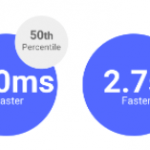How AMP Will Affect The Wider Web
by Ben Frederick, Staff Writer @mp_benfred, August 11, 2016

Google announced recently that it was expanding its Accelerated Mobile Pages (AMP) to the wider Web. Which basically means two things: the mobile Web is about to get much faster, and it will be more difficult to track consumers as they move through the funnel on mobile.
AMP-compliant pages use a stripped-down version of HTML tags that Google identifies and caches elsewhere. These cached pages can then be loaded directly from Google, instead of redirecting, making them much, much faster for use on mobile.
Previously, AMP was available only to news sites, many of whose mobile pages were a jambalaya of slow-loading ads and tracking scripts that hemorrhaged users. Speed, as multiple studies have shown, is a huge determining factor in retention for sites.
But the faster-loading pages sacrifice both style and ad revenue in favor of speed.
“Ads are often a culprit behind the slow-loading pages,” says Trevor Paulsen, product manager, Adobe Analytics, which has been an analytics partner with AMP since it was released in February. “AMP has done a great job allowing content to load without having ads slow that page down. It kind of works by having ads load as you scroll.”
Paulsen says that while AMP can’t track as many data points, almost all of the questions publishers and retailers may have about the new format can be answered by ensuring that the data is connected across channels.
In the realm of digital analytics, context is king.
MediaPost.com: Search Marketing Daily
(11)














